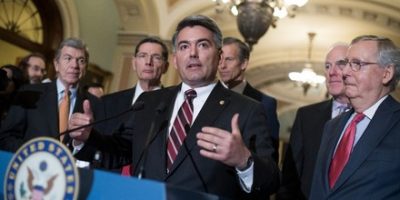 Over the past decade, we’ve become resigned to the sad fact of congressional gridlock: a hopelessly partisan and paralyzed Congress, seemingly unable to pass major legislation on the environmental protection, natural resource conservation or, indeed, any number of other policy fronts. So it has to come as a shock to most observers that this week …
Over the past decade, we’ve become resigned to the sad fact of congressional gridlock: a hopelessly partisan and paralyzed Congress, seemingly unable to pass major legislation on the environmental protection, natural resource conservation or, indeed, any number of other policy fronts. So it has to come as a shock to most observers that this week …
Continue reading "Surprise! Major Land Conservation Bill Poised to Pass Congress"
The post Surprise! Major Land Conservation Bill Poised to Pass Congress appeared first on Legal Planet.
#surprise #overthepast
 Over the past decade, we’ve become resigned to the sad fact of congressional gridlock: a hopelessly partisan and paralyzed Congress, seemingly unable to pass major legislation on the environmental protection, natural resource conservation or, indeed, any number of other policy fronts.
Over the past decade, we’ve become resigned to the sad fact of congressional gridlock: a hopelessly partisan and paralyzed Congress, seemingly unable to pass major legislation on the environmental protection, natural resource conservation or, indeed, any number of other policy fronts.
So it has to come as a shock to most observers that this week the U.S. Senate is poised to pass the first major federal public lands bill in decades. The legislation will then move to the House of Representatives, which is also expected to enact it. Remarkably, the bill is backed by strong bipartisan coalitions in both houses of Congress. And–believe it or not–President Trump has already committed to signing it into law.
The legislation is S. 3422, formally titled the “Great American Outdoors Act.” Authored by Colorado Senator Cory Gardner, the bill has some 59 Republican and Democratic cosponsors. The centerpiece provision of S. 3422 creates a guaranteed source of funding for the federal Land and Water Conservation Fund (LWCF). The LWCF was enacted by a similarly bipartisan Congress in 1964, in order to provide federal funding for the acquisition, preservation and maintenance of federal lands. The historical problem, however, is that the LWCF has been chronically underfunded for most of its history, like many other federal environmental and conservation programs.
As a result, federal funds upon which the National Park Service, U.S. Forest Service, U.S. Fish & Wildlife Service, Bureau of Land Management and Bureau of Indian Education critically depend has been sadly lacking. That’s meant that critical maintenance of our national parks, monuments and historical sites has been deferred for many years; management of national forests to prevent wildfires, pest infestations and other threats has been similarly underfunded; federal wildlife preservation efforts have been fiscally starved; and many new federal land acquisitions have not been possible.
The pending legislation would fix that longstanding set of problems by providing a guaranteed, permanent source of funding for these important land and wildlife resources, equal to 50% of all federal revenues from the development of oil, gas, coal, or alternative or renewable energy on federal lands and offshore waters. Future federal funding for the LWCF is set at $900 million annually, with an additional, comparable amount specifically allocated to chronically-deferred national park maintenance. Together, S. 3422 caps these worthy conservation programs at a generous $1.9 billion annually.
Unsurprisingly, major conservation groups including the League of Conservation Voters and the Nature Conservancy have lined up in support of S. 3422. In a recent New York Times story on the bill, Nature Conservancy spokesman Tom Cors observes: “A window opened and we have to take advantage of it. We might never have all these right conditions come together again.”
But the legislative juggernaut that is S. 3422 has a most interesting political backstory–one tied to the looming battle for control of the U.S. Senate this November. As my Legal Planet colleague Dan Farber noted in a recent post, the current Republican majority in the Senate is under siege in the general election this fall. Two incumbent Republican senators facing especially stiff reelection challenges are the aforementioned Colorado Senator Gardner, who’s running against Democrat and former Colorado Governor John Hickenlooper; and Montana Senator Steve Daines, who’s in an equally close race in November with current Montana Governor Steve Bullock, another popular, moderate Democrat. Senators Gardner and Daines are hoping their full-throated support of S. 3422 will burnish their conservation credentials and attract moderate voters from their respective states in November.

However, with strong support from Senate Democrats, S. 3422 is expected to easily win passage in the Senate this week, and then move on to a similar, affirmative vote in the House.
A final, political footnote: Senate leader McConnell insists publicly that it’s the merits of the bill, rather than Senate election politics, that motivate his strong advocacy of S. 3422. McConnell was quoted recently in the Wall Street Journal regarding the upcoming Senate vote on the bill: “Yeah, it’s in proximity to the elections, but nobody said you oughta quit doing things just because there’s an election.”
This from the same Senate leader who in 2016, the last presidential election year, refused to allow former President Obama’s judicial nominees to be considered by the Senate he controlled. The most prominent and egregious example, of course, was Obama’s nominee to the U.S. Supreme Court, Judge Merrick Garland. McConnell would not allow Garland’s nomination to receive so much as a hearing before the Senate Judiciary Committee, much less a confirmation vote by the full Senate. McConnell’s explanation back in 2016? It was an election year, and so Senate consideration of Obama’s judicial nominees by the Senate should be suspended. So much for doing at least some things in an election year.
To McConnell and his Senate Republican supporters, consistency must indeed be the hobgoblin of small minds.
The post Surprise! Major Land Conservation Bill Poised to Pass Congress appeared first on Legal Planet.
By: Richard Frank
Title: Surprise! Major Land Conservation Bill Poised to Pass Congress
Sourced From: legal-planet.org/2020/06/14/surprise-major-land-conservation-bill-poised-to-pass-congress/
Published Date: Mon, 15 Jun 2020 04:57:23 +0000
Vist Maida on Social Me
Website Links
Maida Law Firm - Auto Accident Attorneys of Houston, by fuseology

No comments:
Post a Comment